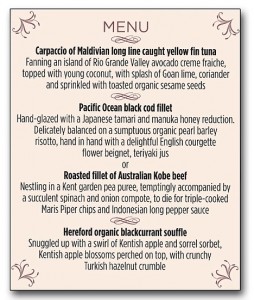
TGIF. In language, grammar and usage news this week: does how we write tell others how smart we are? Do punctuation and grammar matter when we’re flirting digitally? Does the language of a restaurant’s menu tell us how expensive the restaurant is? Plus some spelling challenges presented to U.S. foreign policy reporters; movie titles that make us cringe; and the Kim Kardashian of punctuation marks …
~~~~
How you write can affect how smart others perceive you to be. According to a piece in the Atlantic, “Typing … in the Comic Sans font … could ruin the whole thing: a Princeton researcher found that a hard-to-read font made an author seem dumber, while a clean, simple typeface (Times New Roman, in the study) made him or her seem more intelligent. The same researcher also looked at how using big words (a classic strategy for impressing others) affects perceived intelligence. Counterintuitively, grandiose vocabulary diminished participants’ impressions of authors’ cerebral capacity. Put another way: simpler writing seems smarter.”
* * *
“The dash is the Kim Kardashian of punctuation marks: misplaced, over-exposed, shamelessly self-promoting, always eager to elbow out her jealous sisters the comma, colon, and semicolon.” So Roy Peter Clark maintains on Poynter.
* * *
The Huffington Post has identified 18 movies whose titles make every grammar geek cringe. It’s mostly a case of missing hyphens (“40 Year-Old Virgin” has a slightly pedophiliac quality to it) and apostrophes (“Two Weeks Notice” cries out for one); but when it comes to Zach Braff’s new movie, he’s
* * *
“Funky or very informal spelling” is the biggest turnoff for both men and women when it comes to digital flirting, according to the results of a digital flirting rules survey done by Omlet, a chat app. …For women, the second biggest turnoff was the lack of punctuation and grammar.” Delaware’s News Journal has the story.
* * *
The Hill has published an article on the spelling challenges of U.S. foreign policy. Is it ISIS or ISIL?
* * *
Does the language of a restaurant’s menu indicate how expensive it is? Dan Jurafsky has found that it does, as reported in the Atlantic. “Fancy restaurants, not surprisingly, use fancier—and longer—words than cheaper restaurants do (think accompaniments and decaffeinated coffee, not sides and decaf)…. Lower-priced restaurants, meanwhile, rely on “linguistic fillers”: subjective words like delicious, flaky, and fluffy. These are the empty calories of menus, less indicative of flavor than of low prices. Cheaper establishments also use terms like ripe and fresh, which Jurafsky calls “status anxiety” words.” Does that mean I get a bargain when “steak frites” is on the menu?
* * *











